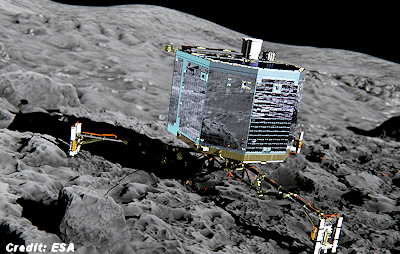BERLIN — The European Space Agency's Philae comet lander "sniffed" organic molecules before its primary battery ran out and it shut down, German scientists said. They said it was not yet clear whether the molecules included the complex compounds that make up proteins. One of the key aims of the mission is to discover whether carbon-based compounds, the basis of life as we know it, were brought to early Earth by comets.
Philae landed on Comet 67P/Churyumov–Gerasimenko after a 10-year journey through space aboard the Rosetta spacecraft, on a mission to unlock details about how planets and perhaps even how life evolved. It wrapped up a 57-hour marathon of scientific experiments on the comet's surface on Saturday as its batteries ran out. Philae's COSAC gas-analyzing instrument was able to sniff the comet's ultra-thin atmosphere and detect the first organic molecules after landing, the DLR German Aerospace Center said. The lander also drilled into the comet's surface, although it is still unclear whether Philae managed to deliver a sample to COSAC for analysis. . . .
Continue Reading . . .
See Also:
Rosetta Mission Comet 'is ALIEN craft?
Rosetta Spacecraft's Planned Orbit Around Comet | VIDEO
Mysterious Radio Signals Coming from Rosetta Comet | VIDEO
SHARE YOUR UFO EXPERIENCE

